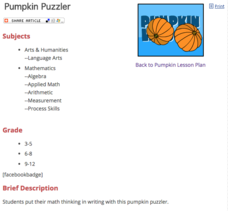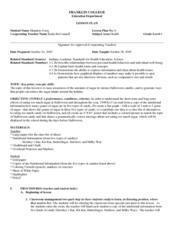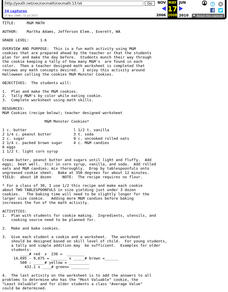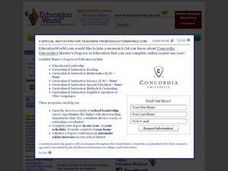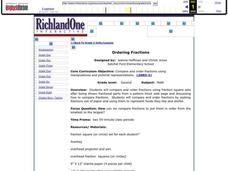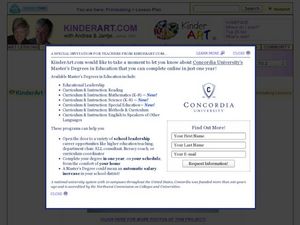Education World
Pumpkin Puzzler
Light the Halloween festivities with an exercise that connects math, physical science, and language arts. After watching a demonstration of a burning candle, learners use division, multiplication, or algebra to determine how many boxes...
Curated OER
Multiplication Mysteries
Arithmetic apprentices practice problem solving and multiplication with a lift-the-flap pair of reproducibles. In this Halloween mathematics lesson plan, math monsters practice multiplication by making candy corn calculations. They...
Curated OER
Coupon Clippers: Understanding Comparative Shopping
Third graders participate in a shopping spree after listening to Pigs Go to Market: Fun with Math and Shopping. After the story is read aloud, 3rd graders answer discussion questions and review key vocabulary. Students complete provided...
Curated OER
M&M Math
Young scholars research number values by participating in a candy exercise. In this math function instructional activity, students utilize baking ingredients to create cookies and multiply how many M&M's will go into the batch if you...
Curated OER
M&M Math
Students plan and make the M&M cookies, tally M&M's by color while eating cookie, and completing worksheet using math skills.
Curated OER
Halloween Candy/ Sugar Content
Fourth graders examine the amount of sugar contained in Halloween candy by looking at nutritional labels from candy bars. They figure out ways to encourage people to reduce the amount of sugar they eat at this holiday. They look at the...
Education World
Predicting Pumpkins
If you want more pumpkin seeds, you should get a bigger pumpkin—right? Young harvesters use estimation skills to make a hypothesis about how many seeds they will find in a pumpkin before examining the real number inside.
Curated OER
M&M Cookie Math
Students munch their way through a cookie keeping a tally of how many M&M's are found of each color.
Curated OER
Clowning Around: Drawing
Kids create a clown out of shapes. They work to show emotions while practicing their drawing skills. Pupils use circles, triangles, squares, oil pastels, and their imagination to draw, color, and decorate a sad or happy clown. Tip: Have...
Curated OER
Holiday Greeting Cards: A Graphing Activity
Students examine statistics about the popular type of greeting cards and create pie or bar chart using an online tool. They illustrate the sales statistics for the greeting cards before making the charts.
Curated OER
Children's Literature Across the Curriculum Ideas-Harvey Potter's Balloon Farm
Young scholars read Harvey Potter's Balloon Farm by Jerdine Nolen Harold. They complete a variety of cross-curricular activities surrounding the study of balloons. Included are reading, art, math, science, writing, social studies, and...
Curated OER
Sizing Pumpkins
Fifth graders study the sizes of pumpkins. They measure and record the diameters of pumpkins. They create five subtraction problems and solve them. They weigh their pumpkins, record the data and select two pumpkins to make a graph of...
Curated OER
Ordering Fractions
Second graders use shapes to create various fractions. For this fractions lesson, 2nd graders define a fraction, visit a website where they make fractions using various shapes, and use a fraction square set to create and name...
Curated OER
Calendar Skills
First graders use an October calendar to trace numbers, trace letters, and identify dates as being in the past, present, and future. In this Social Studies lesson plan, 1st graders label events on the calendar in order to gain deeper...
Curated OER
A Year to Remember
Students create calendars. In this technology skills lesson, students collaborate to prepare calendars that include special days of the year as well as digital photograph collages.
Curated OER
Vampires: Fact or Fiction?
Students predict how many vampires are in the world, based on the legend that, once bitten, each victim becomes a vampire. Extrapolating how many vampires would populate the earth in 30+ weeks, students then compare the total predicted...
Curated OER
When is a Block, not a Block?
Young scholars use a stamped shape image to create a piece of imaginative art. For this stamped art lesson, students use a stamped shape as a starting point to create their own imaginative piece of art that incorporates the stamped shape.


